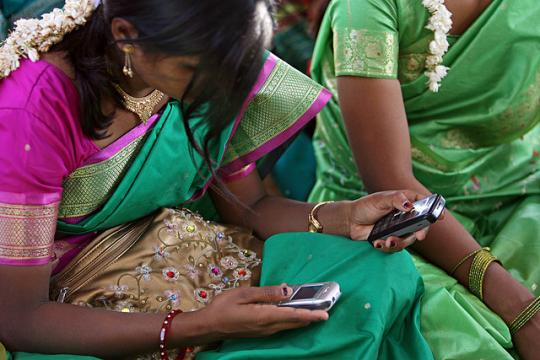At the
Mobile World Congress in Barcelona last week, topics such as Mobile Identity and Mobile for Development and Inclusion stole the spotlight. Today, it’s becoming clearer that secure digital identities can become the gateways to greater social welfare, more inclusive and transparent government and, of course, economic growth.
For its tenth anniversary, the Mobile World Congress had more than 2,100 companies showcasing their innovations in front of record-breaking audiences: over 93,000 attendees from 200 countries.
 The GSM Association (GSMA) also hosted a
seminar program to educate conference participants on industry initiatives such as
Connected Women programme: a timely undertaking that promotes gender diversity in the telecommunications sector.
The GSM Association (GSMA) also hosted a
seminar program to educate conference participants on industry initiatives such as
Connected Women programme: a timely undertaking that promotes gender diversity in the telecommunications sector.
Mobile identity offers a means of extending access to a vast array of services, such as mobile banking and mobile health, to everyone, particularly those who have been previously marginalized, including women and those living in poverty. The ability to get an identity that is verifiable online is a transformational capability that can grant access to banking, mobile payments and healthcare, as well as transportation and other advanced identity-based digital services.
At the most fundamental level, the planning and delivery of economic and social support programs relies on the government’s knowledge of its citizens: who they are, where they live, their social and economic circumstances, and so on. Utilizing mobile devices to register and validate an identity offers a compelling opportunity for governments and businesses to authenticate and then provide access to a broad range of digital services.
In 2014, the findings of a joint research paper research by the Secure Identity Alliance (SIA) and Boston Consulting Group (BCG) indicated that ‘going digital’ could offer governments across the globe up to US$50 billion in annual savings by 2020.
Several other studies have analyzed the positive effect of digital identity on gross domestic product (GDP), employment, tax, business efficiencies and other social factors such as the reduction of cybercrime and identity theft [1].
Taking advantage of the world’s biggest and most influential mobile event last week, the GSMA advocated for its recently launched Mobile Connect solution. Mobile Connect provides users with the ability to identify and authenticate themselves remotely and securely via their mobile phone for digital services. This gives governments the opportunity to build public service offerings for their citizens, while ensuring the user’s private and confidential information is kept safe.
Seventeen leading mobile operators have already been piloting this approach in 13 countries, showing impressive results. The initiative has built on lessons learned from countries like Estonia and Moldova, where innovative Mobile Identity solutions have been pioneered and have helped catalyze the emergence of digital economies.
In Estonia, for example, citizens have been using their mobile identity (Mobiil-ID) to engage with more than 400 public and private sector services since 2007. These range from electronic banking to applying for a driver’s license, to entering or accessing academic grades at university or changing a pension plan. It is all done through the electronic signature function of the mobile device, which holds legal equivalence to a physical signature.
Moldova’s mobile identity (MeID) and mobile signature initiatives enable citizens to access 98 e-services online and sign legal documents. Launched in 2012, this was one of the first and most-successful mobile identity public-private partnerships (PPPs) in the world. One year later, at Mobile World Congress, the government of Moldova received the m-Government Global Mobile Award from the GSMA for the Mobile Signature project.
These are successful examples of where the mobile identity and innovative uses allowed unlocking the potential of the digital economy. The World Bank’s Identification for Development (ID4D) initiative is looking, among others, at replicating those in client countries who have turned to the Bank teams for support.
For its tenth anniversary, the Mobile World Congress had more than 2,100 companies showcasing their innovations in front of record-breaking audiences: over 93,000 attendees from 200 countries.
 The GSM Association (GSMA) also hosted a
seminar program to educate conference participants on industry initiatives such as
Connected Women programme: a timely undertaking that promotes gender diversity in the telecommunications sector.
The GSM Association (GSMA) also hosted a
seminar program to educate conference participants on industry initiatives such as
Connected Women programme: a timely undertaking that promotes gender diversity in the telecommunications sector.
Mobile identity offers a means of extending access to a vast array of services, such as mobile banking and mobile health, to everyone, particularly those who have been previously marginalized, including women and those living in poverty. The ability to get an identity that is verifiable online is a transformational capability that can grant access to banking, mobile payments and healthcare, as well as transportation and other advanced identity-based digital services.
At the most fundamental level, the planning and delivery of economic and social support programs relies on the government’s knowledge of its citizens: who they are, where they live, their social and economic circumstances, and so on. Utilizing mobile devices to register and validate an identity offers a compelling opportunity for governments and businesses to authenticate and then provide access to a broad range of digital services.
In 2014, the findings of a joint research paper research by the Secure Identity Alliance (SIA) and Boston Consulting Group (BCG) indicated that ‘going digital’ could offer governments across the globe up to US$50 billion in annual savings by 2020.
Several other studies have analyzed the positive effect of digital identity on gross domestic product (GDP), employment, tax, business efficiencies and other social factors such as the reduction of cybercrime and identity theft [1].
Taking advantage of the world’s biggest and most influential mobile event last week, the GSMA advocated for its recently launched Mobile Connect solution. Mobile Connect provides users with the ability to identify and authenticate themselves remotely and securely via their mobile phone for digital services. This gives governments the opportunity to build public service offerings for their citizens, while ensuring the user’s private and confidential information is kept safe.
Seventeen leading mobile operators have already been piloting this approach in 13 countries, showing impressive results. The initiative has built on lessons learned from countries like Estonia and Moldova, where innovative Mobile Identity solutions have been pioneered and have helped catalyze the emergence of digital economies.
In Estonia, for example, citizens have been using their mobile identity (Mobiil-ID) to engage with more than 400 public and private sector services since 2007. These range from electronic banking to applying for a driver’s license, to entering or accessing academic grades at university or changing a pension plan. It is all done through the electronic signature function of the mobile device, which holds legal equivalence to a physical signature.
Moldova’s mobile identity (MeID) and mobile signature initiatives enable citizens to access 98 e-services online and sign legal documents. Launched in 2012, this was one of the first and most-successful mobile identity public-private partnerships (PPPs) in the world. One year later, at Mobile World Congress, the government of Moldova received the m-Government Global Mobile Award from the GSMA for the Mobile Signature project.
These are successful examples of where the mobile identity and innovative uses allowed unlocking the potential of the digital economy. The World Bank’s Identification for Development (ID4D) initiative is looking, among others, at replicating those in client countries who have turned to the Bank teams for support.
[1] GSMA and SIA joint paper on Mobile Identity - Unlocking the Potential of the Digital Economy (2014); Álvarez Capón (2010): Catastro, políticas públicas y actividad económica, p. 16 or RSO, CapGemini, CS Transform (2009): Benchlearning: Study on impact measurement of eGovernment; BSG (2013) The value to our Digital identity http://www.lgi.com/PDF/public-policy/The-Value-of-Our-Digital-Identity.pdf


Join the Conversation